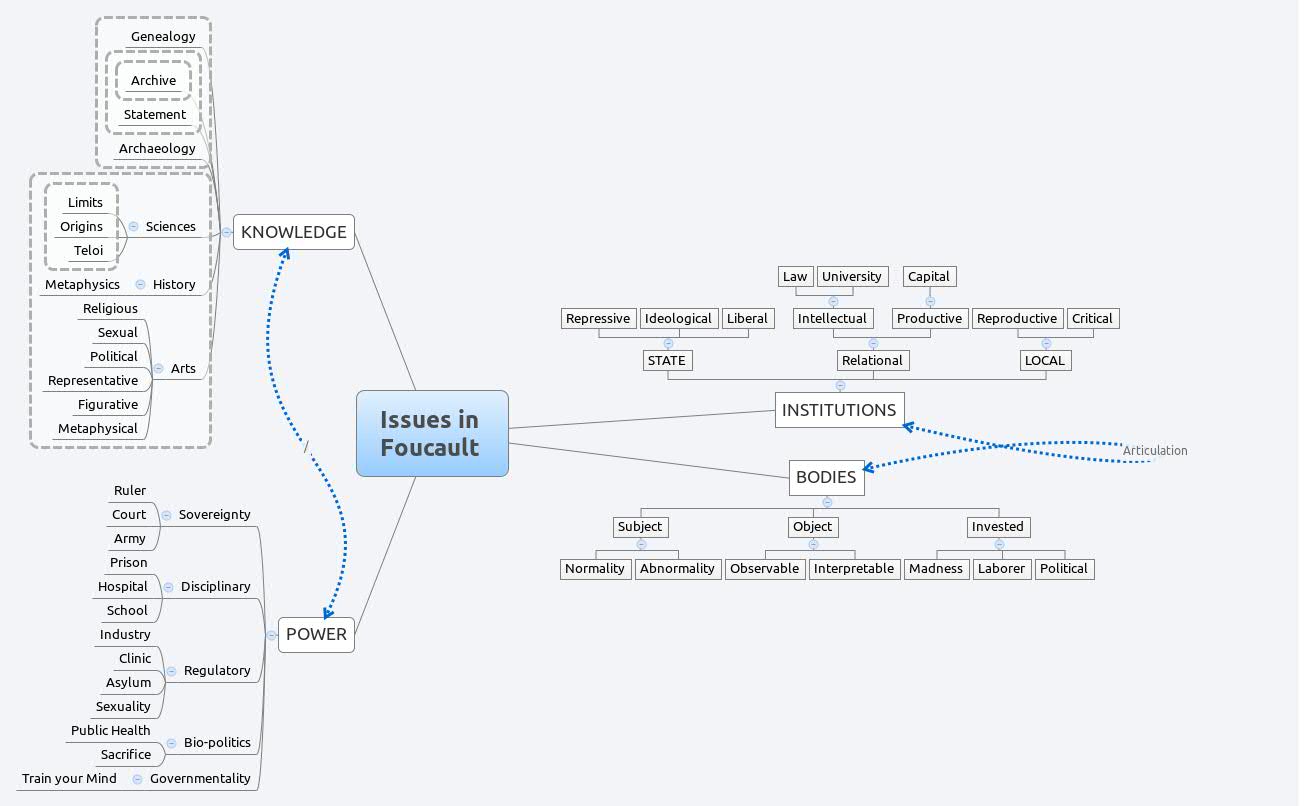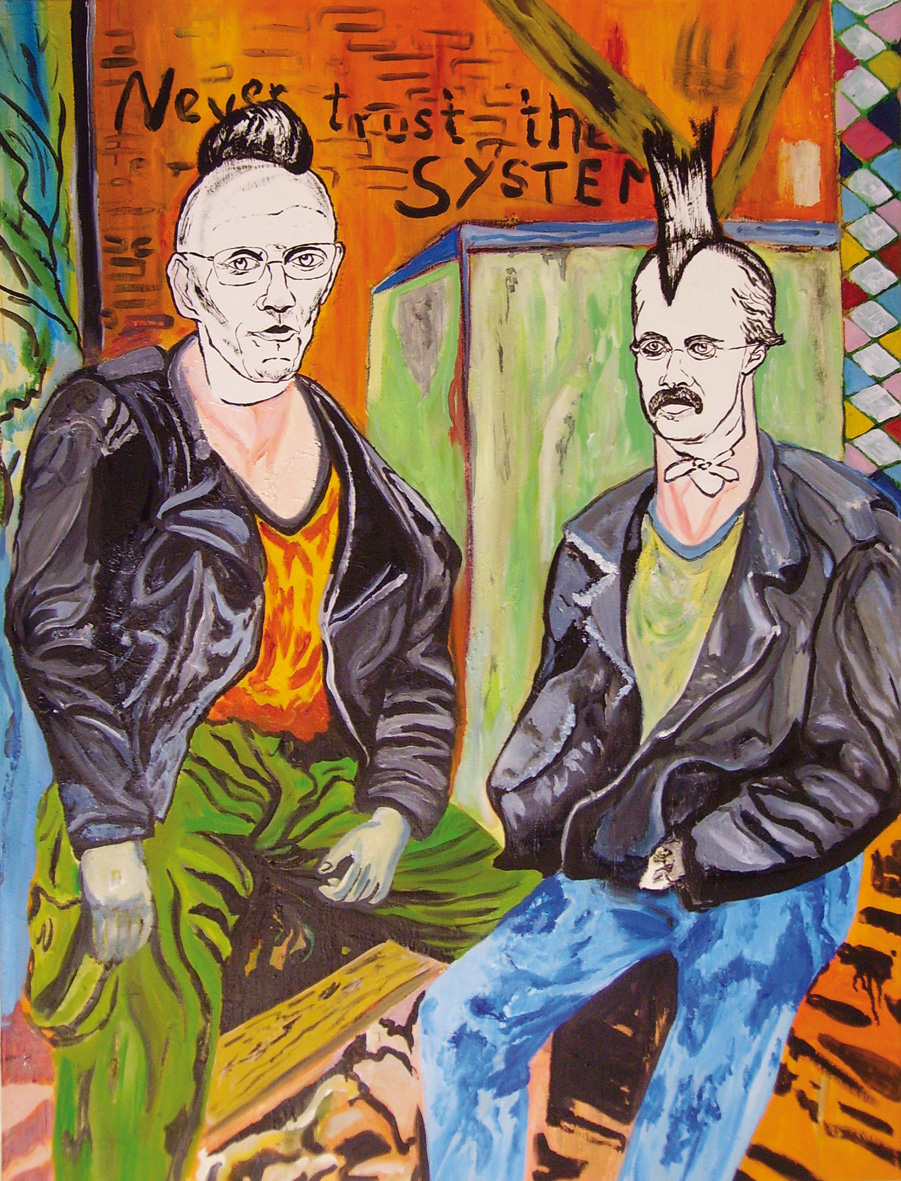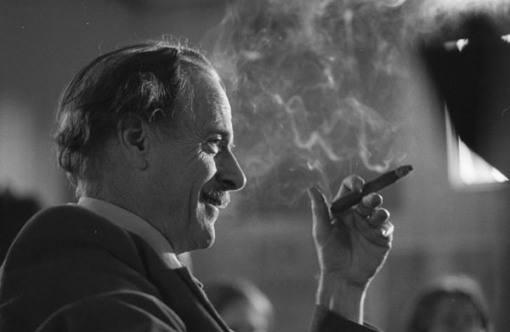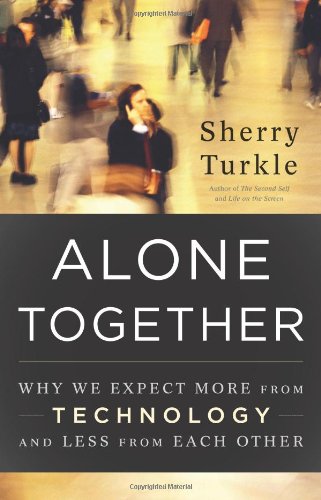The aspect of power/knowledge best suited for adoption by those dissatisfied with traditional political economy, social psychology, or political theory, Foucault’s concept of biopolitics addresses the machinations of power on the historically inscribed body, as well as the diffusion of actual relations of power between such bodies. In the lecture series “Security, Territory, Population” and “The Birth of Biopolitics”, he delves into the details of the conditions of power relations in neoliberal societies. Cautious to distinguish liberal and neoliberal contexts from the commonsense notion of freedom, and to differentiate power relations from individual rights or privileges, his argument rests on the ideas developed in his edited works such as Discipline and Punish, or the end of History of Sexuality. Here, biopolitics takes on the characteristics of State apparatuses, but extends beyond them into the quotidian practices of material, discursive, and economic life.
Tag Archives: concepts


Maps

Foucault – Nietzsche, Genealogy, History
“Genealogy… must expose a body totally inscribed by history, and history’s destruction of the body.” (my translation)

Internet – Lit Reviews – McLuhan, Manovitch
Whether one accepts straightforwardly deterministic speculation or not, whether one prefers to think the mind and the collective mind as functions of or factors in computing, we are bound by mediating forces. As the paragons of privileged speculation, Marshall McLuhan and Lev Manovich stand unchallenged as the sources for media and software theory in the United States. Their conceptual frameworks are most contentious when held against certain French thinkers’. McLuhan’s insight that all media contain as a message a prior medium finds a counterpoint in Regis deBray’s analysis of media as overlapping paradigms, rather than linear progressions. Manovich’s later contributions to software theory as a field in its own right takes as a direct target the archaeology of media as expounded by Michel Foucault, whose concentration on print and writing as valid archival data severely limits his historiographic impulses. But taking these two Anglo writers’ work on their own, we can unpack just where they stand, as well as their utility and inspiration for contemporary thought. Continue reading
The Plan

Internet – Lit Review – Turkle
Turkle, Sherry. Alone Together. New York: Basic, 2011
It would be foolish to refute the core premise of Sherry Turkle’s third installment in her series on computers and people: technology – specifically, robots and computers – have taken on agency in their relationships to humans. Her anecdotal approach threads a compelling argument through selections from her psychoanalytic research that includes over 450 subjects, of all ages. In Turkle’s estimation, computers have become what occupies us, keeping us always tethered and networked, rather than remaining our occupational instruments. Likewise, her staunch humanism views the advent of robotics that go beyond artificial intelligence by performing social functions like caring and emotion as a pivotal “robotic moment” for our lives, and for our concepts of life as such. The stakes of being-human, on her account, are changing, and not necessarily for the better. Continue reading
Foucault – Tutor-Texts and Intellectual Lineage
This first post in a short-term regular series of essays on Michel Foucault deals with his most famous influences. I begin with the precursors to Foucault’s own production of knowledge because their work and tutelage form the conditions of that production. This requires that I oversimplify some of their contributions to cultural scholarship and critical theory. I hope to maintain a baseline level of respect for their importance without fetishizing their names, just as I intend to maintain the tension between the familiarity of Foucault’s own name and the irreducibility of his intellectual production to any single certain thought or text. Enough lingering on qualifications and breast-beating, then. Let me turn to the names and their significance for Foucault’s emergence as a theoretical producer – and event.

- Michel Foucault – image via Creative Commons.
PIC Conference Roundup
The organizers of the Philosophy, Interpretation, and Culture conference put together a phenomenal roster, worth rising at 530 and riding two hours (luckily, as a drowsy passenger riddled with illness) to attend. The overall themes, time and revolution, lent themselves to radical and stimulating interpretation. Harpur College Dean Donald Nieman’s speech praised PIC’s interdisciplinarity and its outstanding reputation, hitting the mark on both counts, but underscoring the ironic troubles facing the program. To that point, great credit goes to Scu and Cecile for their elegant and rigorous work putting the whole thing together in the midst of this crisis.
My paper came first for the first day, and just a few minutes in, the room had settled into the patient quietude of academics parsing an argument about research on cultural theory. The Dean left early on, but about forty people were already gathered for the conference proper, and I delivered my thoughts alongside Brad Kaye‘s provocative paper, which framed a potential mass refusal of work by “disabled and mad” laborers in terms of Negri’s theory and the dark example of Bartleby the Scrivener. His drew many more questions than mine, but when our panel wrapped up, I was able to relax while speaker after speaker delivered high-quality theory and research.
Just about every panel seemed ideally constituted, with concepts and methods playing off of one another in provocative and inspiring ways. The next panel’s juxtaposition of Natalie Churn’s paper on Australian “bogans” with Joanna Grim‘s explanation of and reading from her one-act play “Dawning of Time” illustrated the diversity and creativity that would shine through the rest of the conference. Often, the creative interventions complemented and highlighted their panels’ themes in unexpected ways. For example, Brianna Hersey’s slam-style performance/paper that recounted her personal narrative to argue for an ontologically unstable “queer sick time” set the other papers in that panel on “embodied time” into sharp relief. These included Fanny Söderback‘s work on Kristeva, Grace Hunt’s compelling reading of Susan Brison, and Carolyn Culbertson‘s painstaking comparative approach to Derrida and Kristeva. The following panel combined Rosa Barotsi’s explanation of the revolutionary potential of cinematic slowness, Ross Birdwise‘s video/audio artist, Craig MacKie’s resuscitation the marvelously obscure Henry Darger, and a fabulous explication of the necessity of thinking ecological politics in a framework of ‘deep time.’ The latter, presented by Ben Woodard, would be a great fit at the Cultural Studies conference in the fall.
Peter Gratton‘s keynote speech also broached the question of ecology, though from a somewhat opposite tack. He argued that since politics reduces to time, time becomes the necessary precondition of politics. Taking the standpoint of a certain realism, he posited a “temporalism” of philosophy. From there, he posited a “partage” of many temporalities of reality, and conversely, of the reality of a democratic partage, along with a temporal reality that indicates a partage of time. All this led him to call for a contingent, speculative, and realist “ecology of times” as the grounds for political thought.
By the end of the first day, my illness had overwhelmed me, and I retired to the apartment rather than hanging out with the other conference attendees. That rest served me well, though, the next morning, when a whole new round of challenging ideas came rushing through the second day of the conference.
A panel on epistemology, revolution, and time included two papers on Benjamin by Sylwia Chrostowska and Miles Hentrup, one on the concept of kairos as the time of revolution by Rowan Tepper, and a fascinating rebuttal of a Lacanian turn in Laclau by Javier Burdman. The following panel included yet another Benjamin paper, this one by Christian Garland, as well as another Derrida paper by Chelsea Harry, and the first social media paper, by Kamilla Pietrzyk. The three meshed surprisingly well, and the discussion that followed the presentations was the best-rounded and perhaps one of the liveliest of the day. After this, we got a treat of a panel that included Rochelle Green’s excellent reading of Bloch’s concept of nostalgia, David Kishik‘s “meditations” on Agamben, and Netta Yerushalmy‘s presentation of a dance performance. By this time, my brain was on fire, but that might have had as much to do with illness and its medications as with concepts and their presentations.
Another fabulously well-constituted panel followed. It combined a provocation and research plan from Matt Applegate, on the Manifesto as such, with a reading of Bataille that countered Agamben’s interpretation of Bataille’s concept of sovereignty by Tommaso Tuppini, with one last Benjamin paper, delivered with aplomb by Antoine Chollet. The next panel, on political theology, took a different turn.Devin Shaw delivered the only other reading of Schmitt of the conference than mine, and the antagonism to Spinoza that Shaw set up has sparked more than a few questions in my mind. Daniel Barber compared Negri and Agamben, two tricky figures in political thought, by thinking their uses of the Figure as theological signifiers. Graham Baker unpacked Kierkegaard’s politics of the apocalypse for us. Finally, an undergraduate from Texas, Cameron Vaziri, detailed Foucault’s search for a new concept of revolution via involvement with the Iranian revolution of the 1970s. By the time the final panel came around, the crowd had thinned out. Because of that, they missed perhaps the most challenging lineup of papers of the conference. Three of the four dealt with Deleuze, and the one that didn’t read Nietzsche. As a humanist, no less – Jordan Batson framed Nietzsche’s grounding of History as a human science in terms of its methodological requirement for a telos of Life. The Deleuze papers included Allison Merrick’s treatment of the differences between Deleuze’s concept of “becoming” and a concept of “history” as such. This was followed by Bryan Nelson’s complementary argument that “becoming-democratic” for Deleuze always situates actually existing democracy, and perhaps even politics as such, in an unpresentable future. Finally, Anupa Batra presented an excellent, patient explication of the unique and problematic temporality of Deleuze’s “becoming-woman.”
Immediately after the last panel, I had to leave. I regret that, because of this, I couldn’t have spent a little more time just talking with some of these brilliant and assiduous scholars and artists. Hopefully, as I begin to catch up on their various blogs and publications, they’ll all appear in the conferences and venues that link us across institutions, geography, and disciplines. I’ll consider coming into contact with them again a great privilege.


